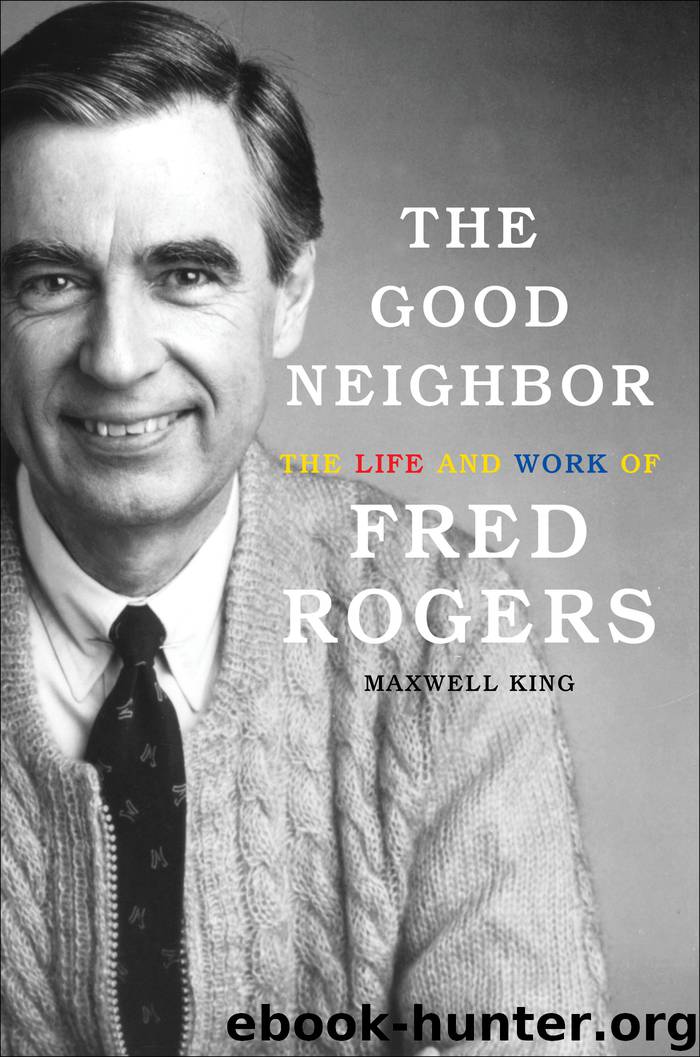The Good Neighbor by Maxwell King

Author:Maxwell King
Language: eng
Format: epub
Publisher: Abrams
Published: 2018-09-19T16:00:00+00:00
In exposing children to art forms like opera, in addressing serious social issues, and in integrating Margaret McFarland’s child-development research into a program for preschoolers, Fred Rogers changed the landscape of children’s programming and strongly influenced the television medium itself. Ellen Wartella, professor of communication studies and psychology at Northwestern University and a leading scholar of the role of media in children’s development, explains: “Fred Rogers and the educational shows on public television were able to demonstrate that [television was not inherently bad], that there was a market for quality children’s television, and now you see a lot more quality.”33
Wartella adds that, at the point at which Mister Rogers’ Neighborhood and Sesame Street came on screen, there was great concern over the impact of violent programming on children, and the medium itself was seen to hold little educational value. Only a few years earlier, Federal Communications Commission Chairman Newton Minow had described television as a “vast wasteland.”
Rogers and Sesame Street, according to Wartella, helped restore the medium’s reputation: “There wasn’t inherently anything in the medium that required TV to be violent to attract an audience . . . and concern about the audience, particularly the child audience, from someone who had Fred Rogers’s understanding of developmental psychology, his inherently compassionate nature, and his concern about taking care of children—that he would produce a program that would be an icon of a different model of TV at the same moment that violence was so much the topic of discussion about television—it’s really quite remarkable.”34
Wartella also emphasizes the importance of Rogers’s distinctive approach to social and emotional learning: “It’s not that he didn’t introduce knowledge—all those tours of how you make ice cream—and there were lots of things that he had that were very important in introducing children to the world. But he did it within a context that he was very much concerned with the social and emotional wellbeing of children, and that was in contradistinction to the time.”35
This emphasis came, of course, from Fred’s work with McFarland and the Arsenal Center. She and Benjamin Spock and Erik Erikson and the other researchers there had been learning that very young children simply don’t learn very well in a cognitive sense unless their social and emotional development is advancing effectively. Sesame Street, by contrast, focused initially on learning words and numbers. It was decades before the field of early education and children’s television caught up to Rogers.
Though not persuasive to some, for the most part Fred Rogers’s gentle, childish qualities came across well to parents. And his presentation was applauded by experts in education and child development.
In a 2007 interview, Ellen Galinsky, president of the Families and Work Institute and author of Mind in the Making, said: “He’s authentic. He’s genuine. He connects on an intellectual and a social and emotional level all at once. He does care about people. That song about ‘you’re special’ is real for him. He retained his childlike self. Particularly for teachers that’s very important, because they care about that childlike self in themselves.
Download
This site does not store any files on its server. We only index and link to content provided by other sites. Please contact the content providers to delete copyright contents if any and email us, we'll remove relevant links or contents immediately.
Cecilia; Or, Memoirs of an Heiress — Volume 2 by Fanny Burney(31929)
Cecilia; Or, Memoirs of an Heiress — Volume 3 by Fanny Burney(31919)
Fanny Burney by Claire Harman(26584)
We're Going to Need More Wine by Gabrielle Union(19023)
Plagued by Fire by Paul Hendrickson(17394)
All the Missing Girls by Megan Miranda(15899)
Cat's cradle by Kurt Vonnegut(15310)
Bombshells: Glamour Girls of a Lifetime by Sullivan Steve(14041)
For the Love of Europe by Rick Steves(13834)
Leonardo da Vinci by Walter Isaacson(13294)
4 3 2 1: A Novel by Paul Auster(12357)
The remains of the day by Kazuo Ishiguro(8955)
Adultolescence by Gabbie Hanna(8904)
Note to Self by Connor Franta(7659)
Diary of a Player by Brad Paisley(7540)
Giovanni's Room by James Baldwin(7305)
What Does This Button Do? by Bruce Dickinson(6188)
Ego Is the Enemy by Ryan Holiday(5395)
Born a Crime by Trevor Noah(5361)
